Finding the best e-commerce SEO companies is essential if your e-commerce site aims to increase online sales from organic search. The right ecommerce SEO agency combines technical SEO, keyword research, content marketing, and conversion rate optimization so product pages earn stronger search visibility, attract organic visitors, and convert website traffic into revenue. Below, you’ll find 10 verified SEO companies with e-commerce SEO services designed for measurable outcomes, sourced from their official sites only.
Quick Answer (TL;DR)
Top picks: Leapsly, Coalition Technologies, OuterBox. Leapsly focuses on full-stack ecommerce SEO services tied to business outcomes. Coalition emphasizes Shopify SEO with CRO and technical fixes. OuterBox brings 20+ years of ecommerce SEO experience and enterprise-ready execution for complex catalogs.
10 Best Ecommerce SEO Companies in 2025
1) Leapsly

Leapsly provides e-commerce SEO services that align ranking gains with online revenue, optimizing product pages, categories, filters, and the site structure shoppers rely on to find and buy. Our service pages emphasize technical SEO, on-page optimization, schema markup, and content marketing to increase qualified traffic and conversions for e-commerce businesses of different sizes.
Leapsly’s approach covers keyword research for high-intent content, meta descriptions and titles, internal linking, and site speed improvements for mobile devices, so key landing pages and product descriptions are fully optimized for search engines and users. The result is stronger organic visibility, better search results placement, and more consistent measurable growth in online revenue.
2) Loopex Digital
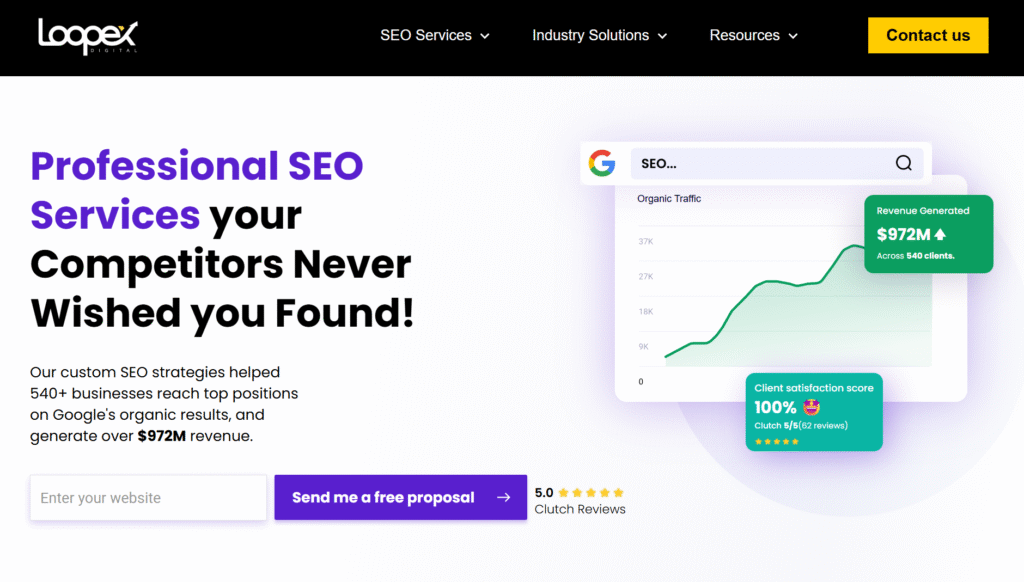
Loopex Digital positions itself as a technically advanced e-commerce SEO agency with deep experience across Shopify, Magento, WooCommerce, and BigCommerce. They have generated over $389 million in revenue for ecommerce clients. Their work centers on fixing architectural issues, optimizing product and category pages, building topical authority, and earning high-quality backlinks that improve keyword rankings and drive sales. Documented case studies show significant increases in traffic, revenue, and domain authority.
For brands needing a methodical, data-driven partner, especially those navigating complex catalogs, international SEO, or technical bottlenecks, Loopex offers structured processes and transparent reporting that tie SEO efforts directly to measurable business outcomes.
3) Coalition Technologies
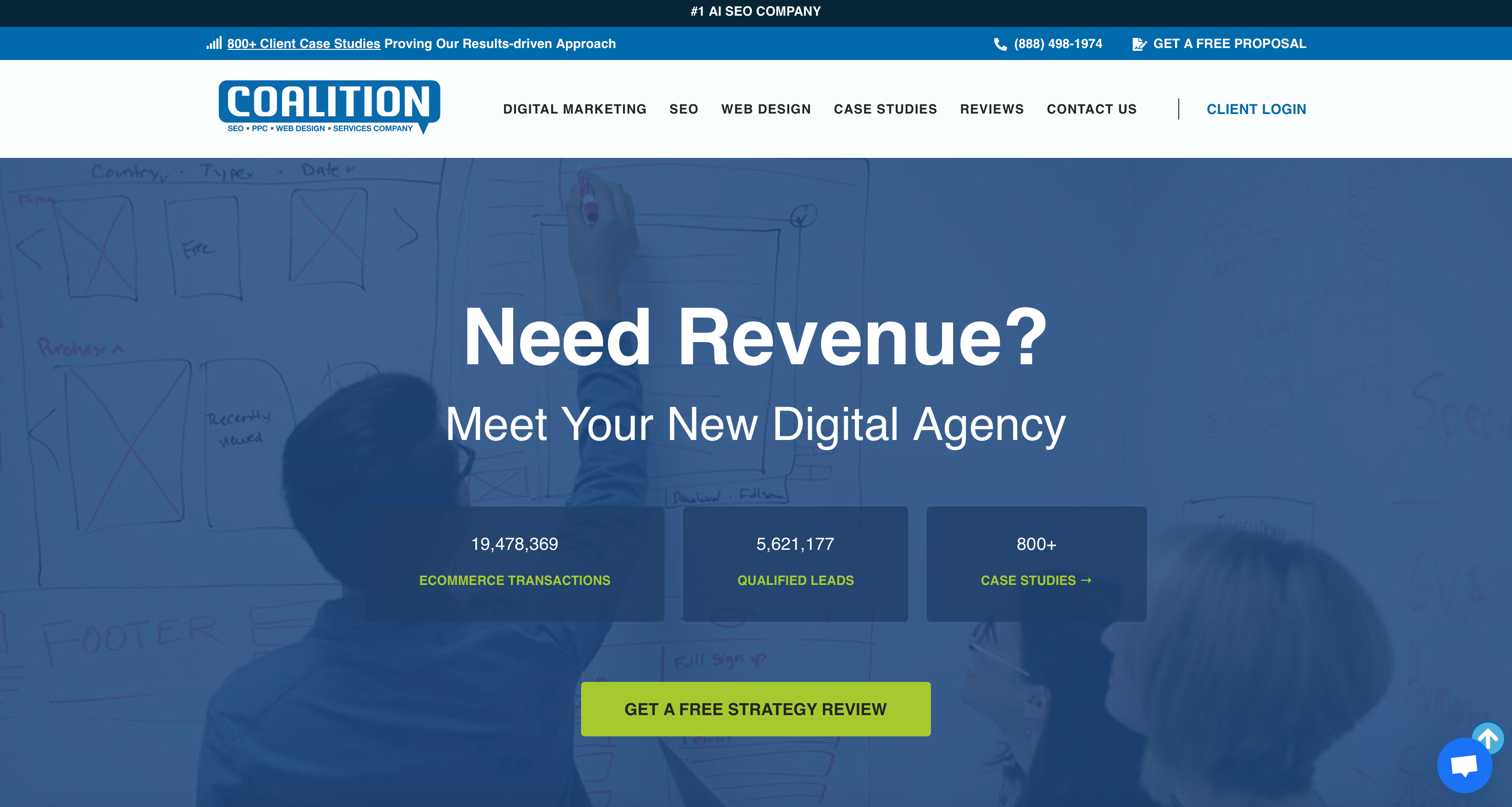
Coalition Technologies is a long-standing SEO services company with deep Shopify SEO expertise. They offer technical SEO (metadata fixes, proper internal linking, redirects), mobile optimization, and CRO-informed changes that connect store pages with the relevant keywords customers search for, aiming to increase organic traffic and sales for larger catalogs.
Coalition provides a full digital marketing stack (SEO, web design, development, email, social, PPC) and positions the team as an expert ecommerce SEO agency that can improve search visibility and conversions across ecommerce platforms. This breadth is useful for targeted SEO strategies that require paid ads and design support alongside SEO.
4) OuterBox
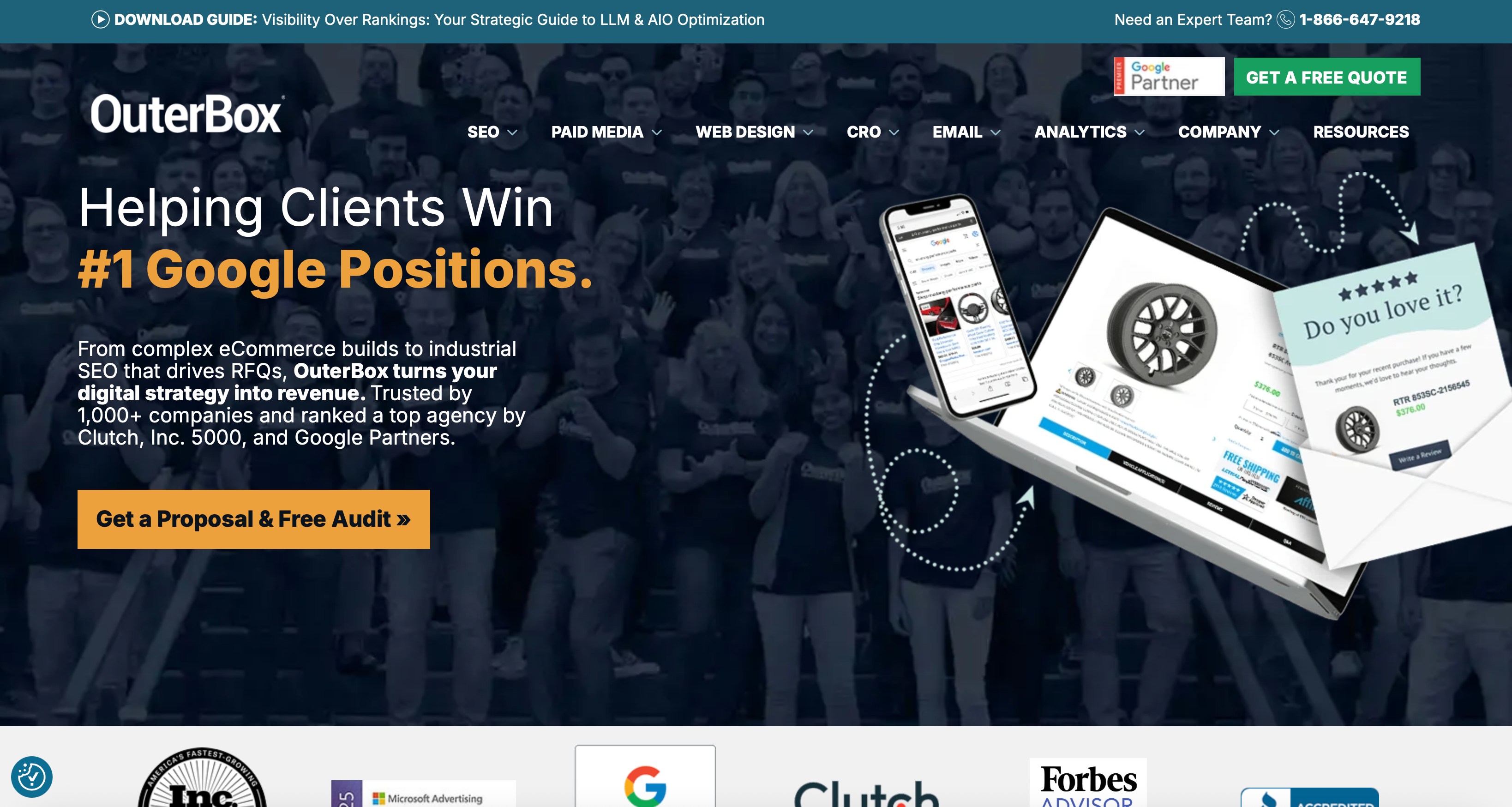
OuterBox presents itself as a world’s-best e-commerce SEO services agency with 20+ years in the field, focused on optimizing website structure, content, keywords, images, and meta descriptions specifically for e-commerce. Their e-commerce SEO page stresses that an e-commerce site requires coordinated optimization of informational content, categories, and product pages to please search engine algorithms and lift organic search results and revenue.
OuterBox also highlights integrated digital marketing capabilities (SEO, paid search, CRO, email marketing, e-commerce development) and a large US-based team, helpful for enterprise brands managing complex e-commerce platforms and seeking measurable outcomes at scale.
5) Inflow
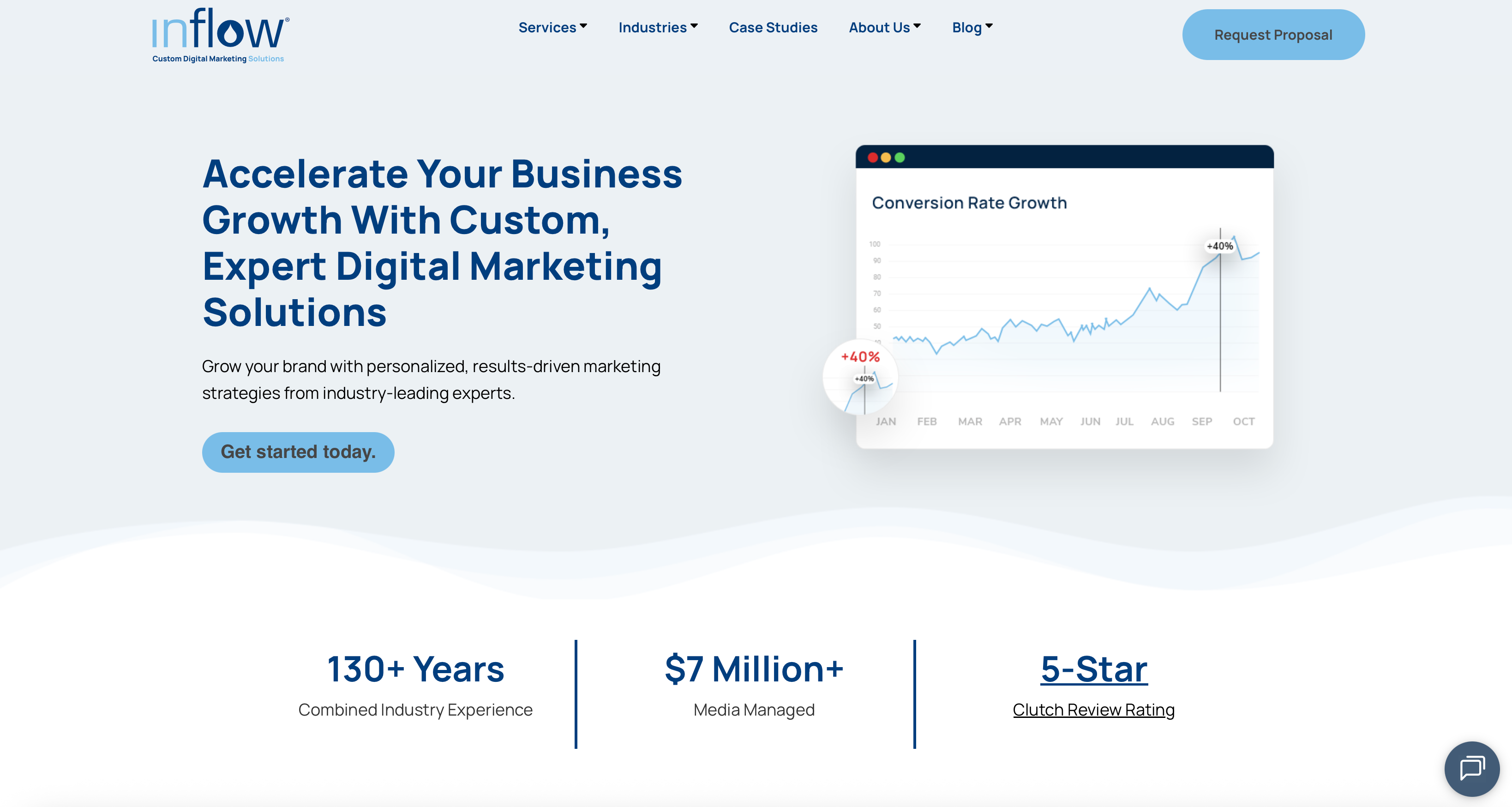
Inflow positions itself as an e-commerce SEO specialist for growth-minded retailers, with materials showing platform experience (e.g., Magento, Shopify, BigCommerce) and case work like SEO migrations that preserved and grew traffic. Their content details practical processes, technical improvements, site speed work, and category/product optimization, to increase organic traffic and online revenue.
If your store’s needs include targeted SEO for mid-market scale or platform transitions (e.g., Magento SEO), Inflow’s documented how-tos and case examples show a web strategy geared toward measurable results over vanity metrics.
6) Victorious
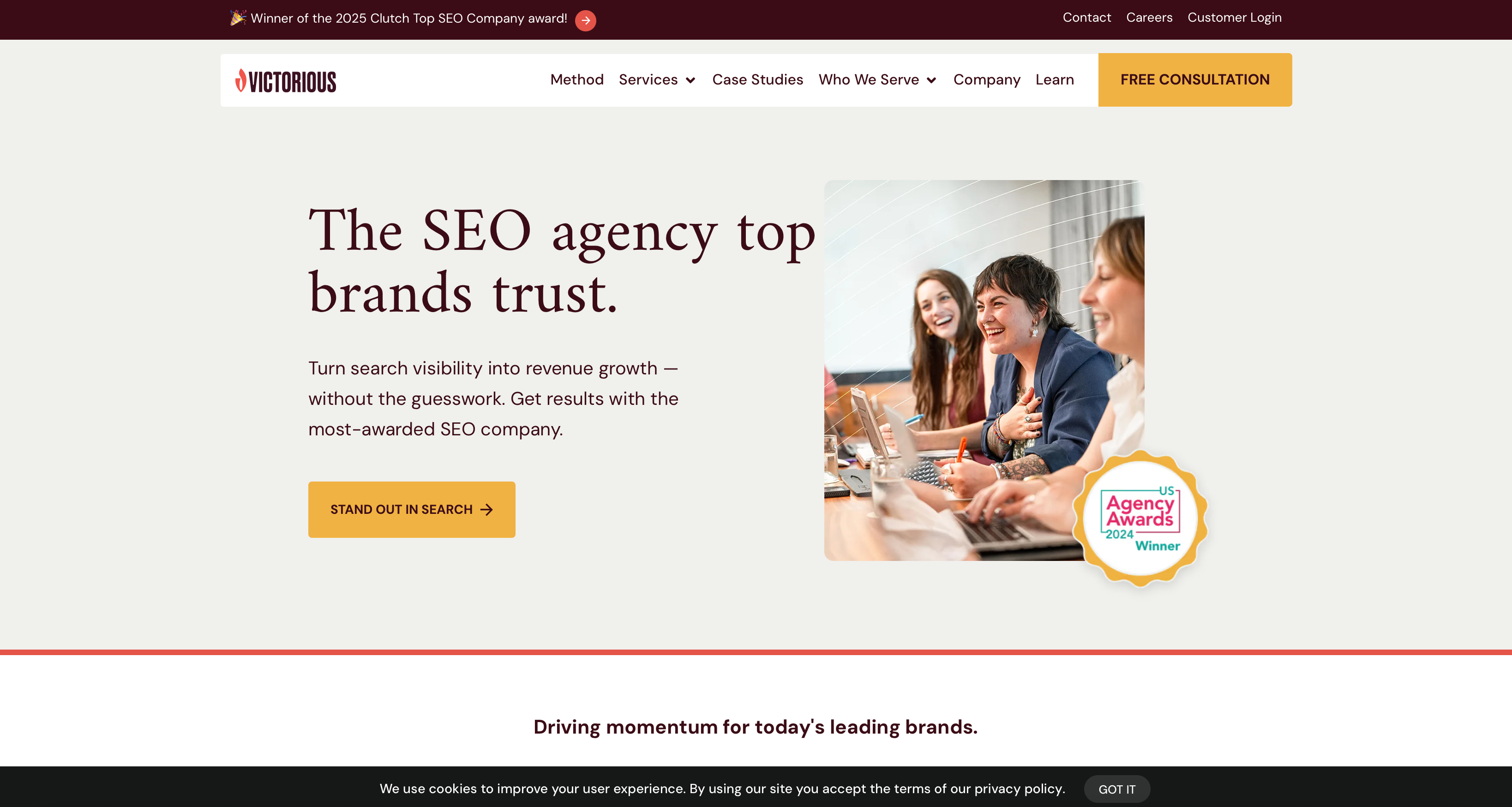
Victorious publishes in-depth guides for e-commerce SEO, including technical SEO best practices, site structure, site speed, crawl/indexation, and structured data, so retailers can shore up fundamentals and lift keyword rankings. Their editorial resources focus on steps that make ecommerce sites easier for search engines to crawl and understand, which supports organic visibility and sales.
If your priority is methodical technical SEO paired with clear communication and reporting, Victorious’s materials reflect an SEO agency that teaches the “why” and “how” behind search engine optimization for e-commerce, useful for teams that want a transparent process tied to measurable outcomes.
7) Sure Oak
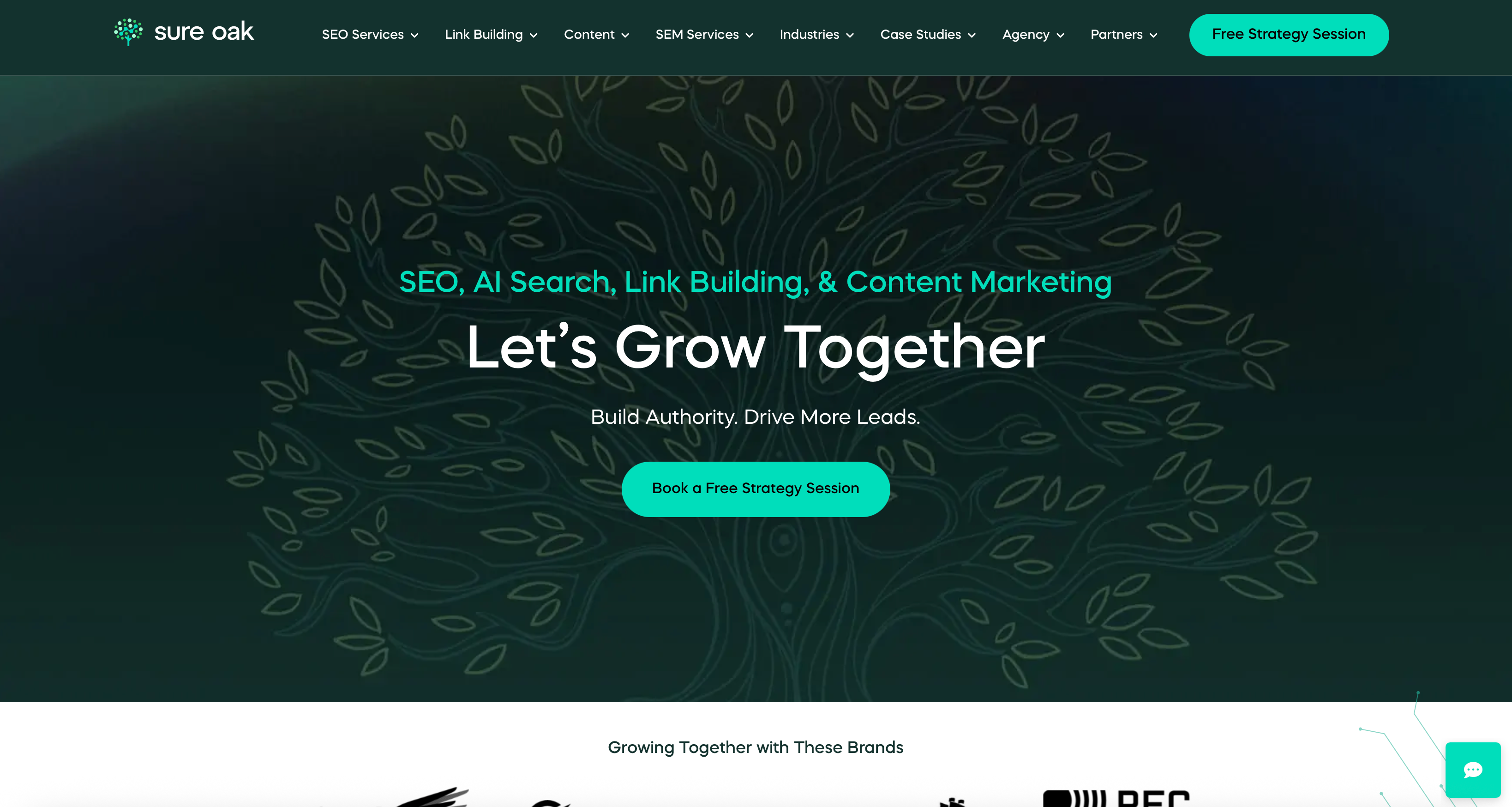
Sure Oak offers e-commerce SEO services aimed at improving keyword rankings and traffic for online retailers. Their ecommerce pages and case studies emphasize proven strategies to grow organic revenue, with examples of double-digit gains in organic sessions and orders. Sure Oak also calls out monthly reports and tailored strategies instead of a one-size-fits-all plan.
For brands wanting a balance of technical SEO, content marketing, and link building, plus flexibility in scoping, Sure Oak’s positioning suits small businesses and mid-market stores seeking measurable growth and sustained organic search performance.
8) SEO Brand
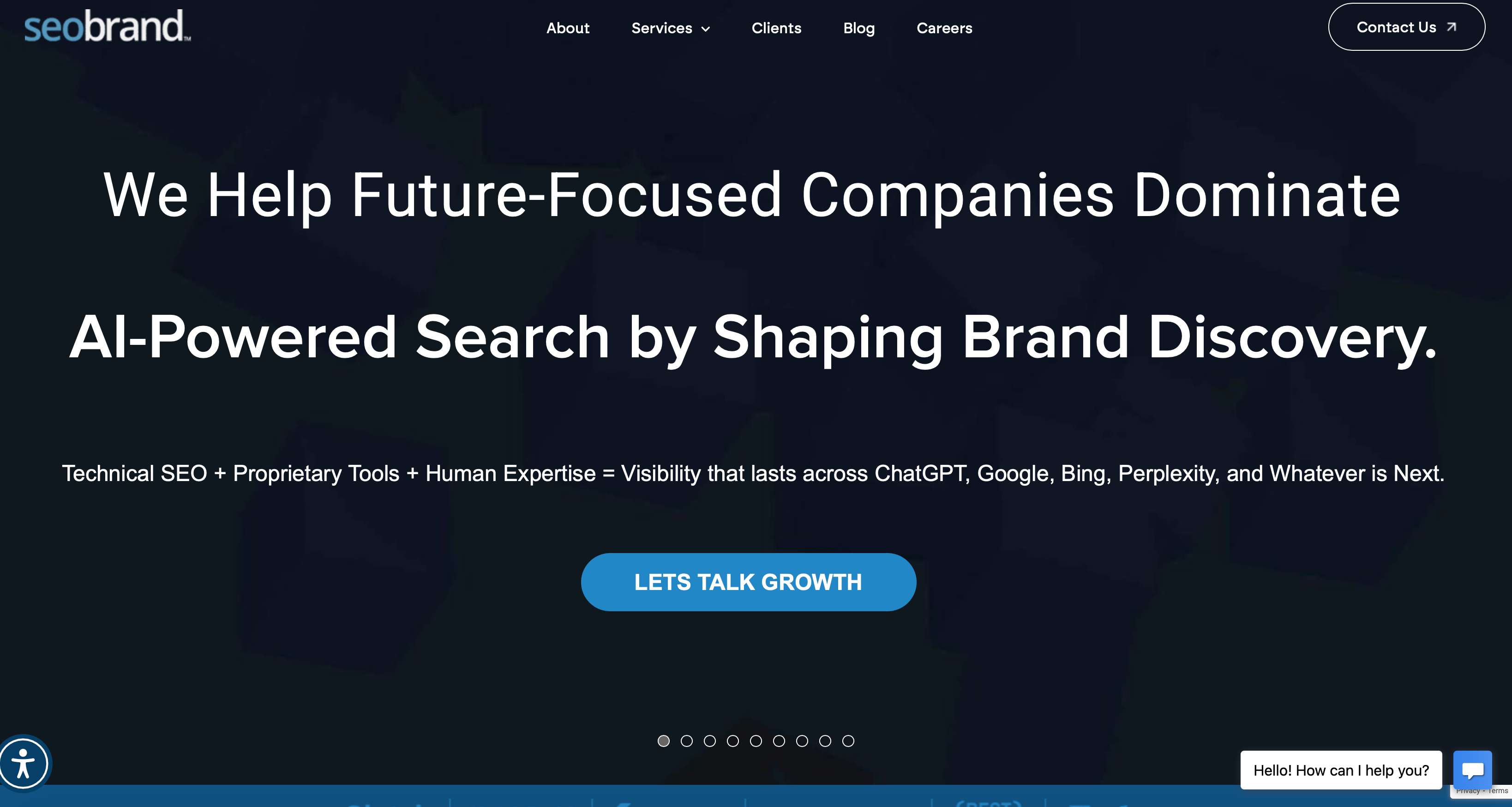
SEO Brand supports e-commerce growth on search engines and marketplaces, with dedicated Amazon SEO services for account setup, audits, product listing optimization, and ongoing listing management alongside Amazon PPC management. That multichannel focus helps ecommerce companies expand organic listings and paid reach on Amazon while continuing SEO for their online store.
If your business sells across channels, SEO Brand’s service lineup (SEO, PPC, Social, Content, Amazon SEO) is structured to coordinate keyword research, on-page and technical SEO, and marketplace optimization for measurable results.
9) 1Digital Agency
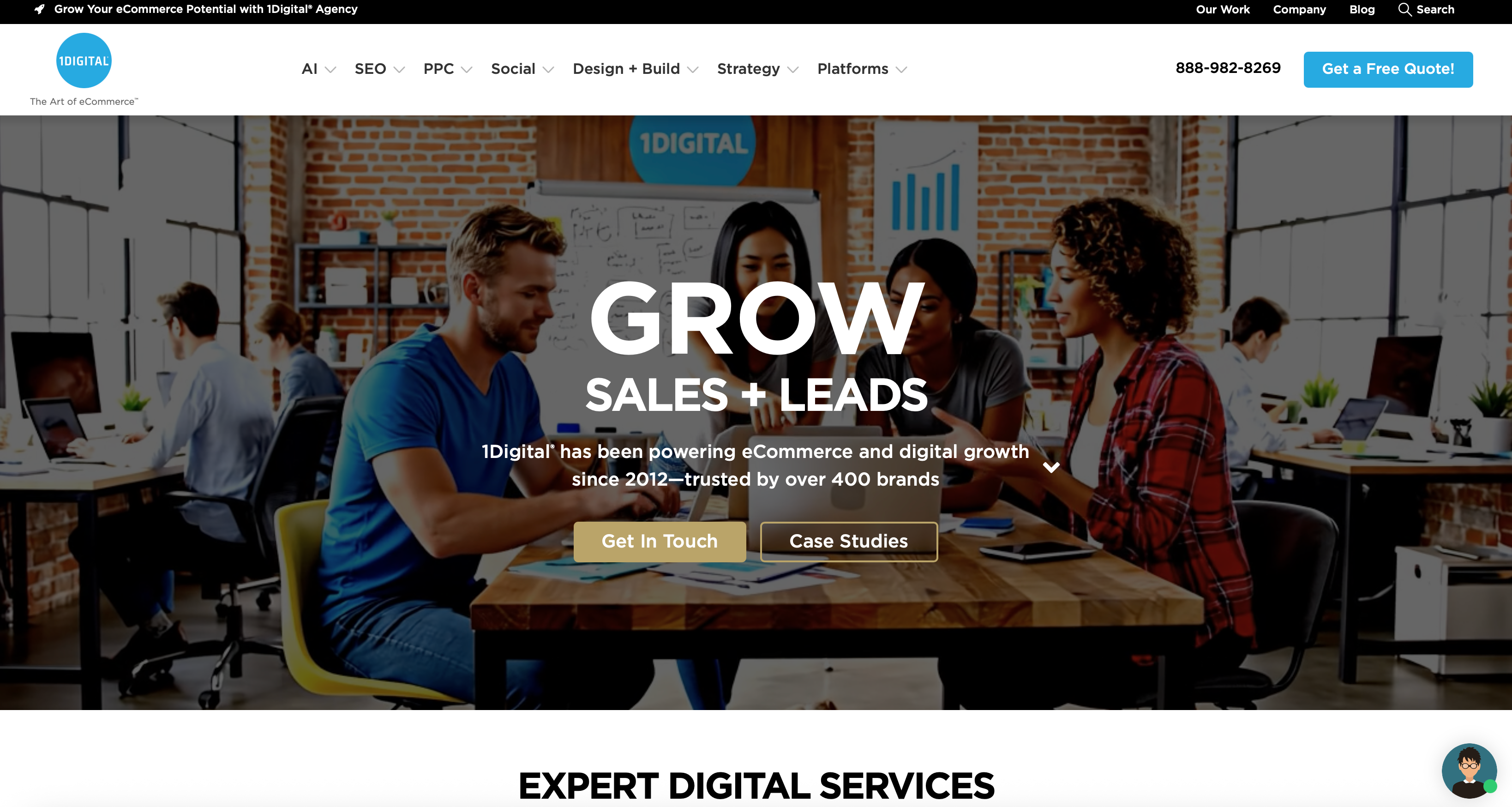
1Digital Agency markets itself as an e-commerce-only digital firm combining e-commerce SEO, AI SEO, PPC, web design, and platform development. They create integrated strategies for measurable growth, which is helpful if you need SEO services that also coordinate design/dev updates and performance marketing for your online store.
1Digital’s educational content further outlines e-commerce SEO basics: keyword research, product page optimization, SEO-friendly URLs, and site structure that helps search engines understand large catalogs, useful for merchants who want clarity on best practices before scaling efforts.
10) Thrive Internet Marketing Agency
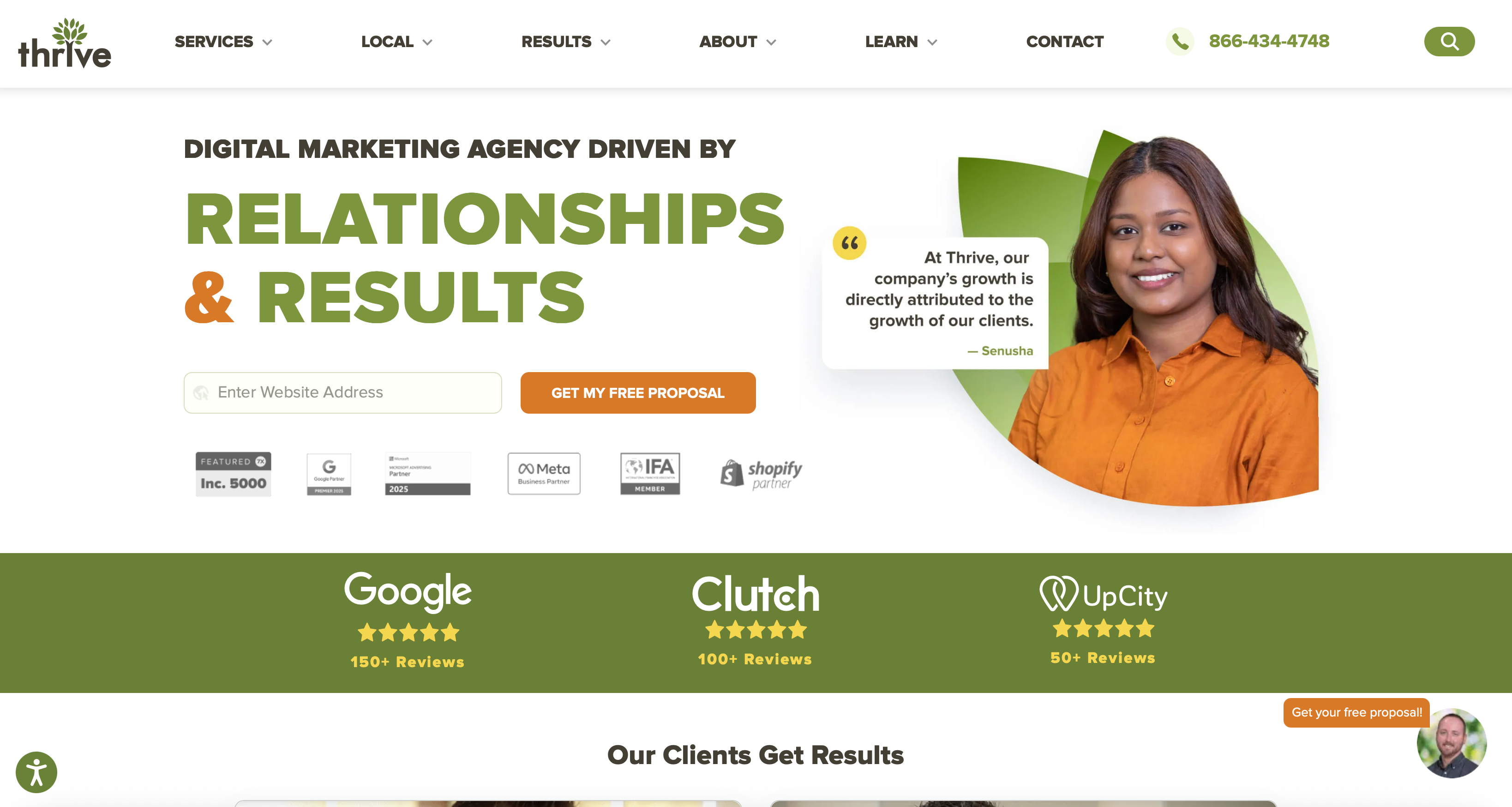
Thrive provides a broad digital marketing suite with a dedicated e-commerce SEO offering that includes keyword research, on-page and technical SEO, plus conversion-focused strategy. Their services also highlight complementary channels (PPC, email marketing, and web design) so e-commerce brands can align paid advertising with SEO for strategic growth and lead generation.
For retailers who want both SEO and paid support in one place, Thrive’s mix is designed to increase website traffic, improve conversion rate, and connect SEO strategy to business-level metrics.
How to Choose the Right E-commerce SEO Partner
A great e-commerce SEO agency connects SEO strategy to business objectives, not vanity metrics. Look for teams that can align technical SEO, lead generation, on-page optimization, schema markup, internal linking, and content marketing with your funnel and product economics, then prove impact on online sales, conversion rate, and organic revenue with reporting you can trust.
Ask for platform experience (Shopify/Magento/BigCommerce), a plan for mobile optimization and site speed, a roadmap for long-tail keywords, and how they’ll handle landing pages, meta descriptions, and product pages at scale. The right partner should recommend targeted SEO steps that deliver measurable growth, and explain the why behind each change.
Look for Revenue-Driven Strategy
Ranking without conversions won’t move the business. Your partner should map relevant keywords to high-intent content, test product page changes, and quantify how website traffic converts, then iterate. Agencies in this list stress technical fixes (site speed, crawlability), content and category structure, and clarity in reporting, so improvements show up in organic search and revenue, not just search engine dashboards.
Choose a Proactive, Dedicated Team
Whether you’re small business or enterprise, you’ll benefit from an expert team with clear communication, a defined cadence (e.g., weekly or regular calls), and actionable reporting. Look for specifics on handling technical issues, internal linking, schema, and ongoing content creation so your store remains fully optimized as catalogs evolve and new products launch.
Frequently Asked Questions (FAQs)
What makes a good ecommerce SEO company?
Depth in technical SEO, platform familiarity (Shopify/Magento/BigCommerce), and a plan that connects keyword research, on-page and content with conversion rate optimization and revenue reporting, so organic traffic leads to online sales.
How long does ecommerce SEO take to show results?
Most e-commerce SEO programs show traction in 3–6 months, with stronger gains as technical fixes, content, and product pages compound into sustained organic search growth.
Do ecommerce SEO agencies help with product pages?
Yes. Agencies prioritize product descriptions, titles, meta descriptions, structured data (schema), internal links, and category structure to improve search visibility and conversion rate.
Is Leapsly a good fit for small e-commerce stores?
Leapsly’s pages describe tailored e-commerce SEO services for different store sizes, emphasizing technical SEO, on-page improvements to categories and products, and reporting tied to measurable outcomes.
